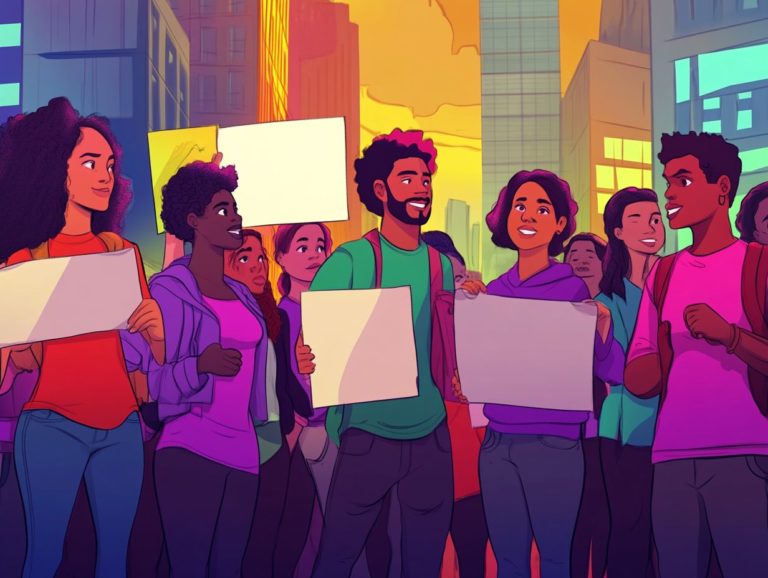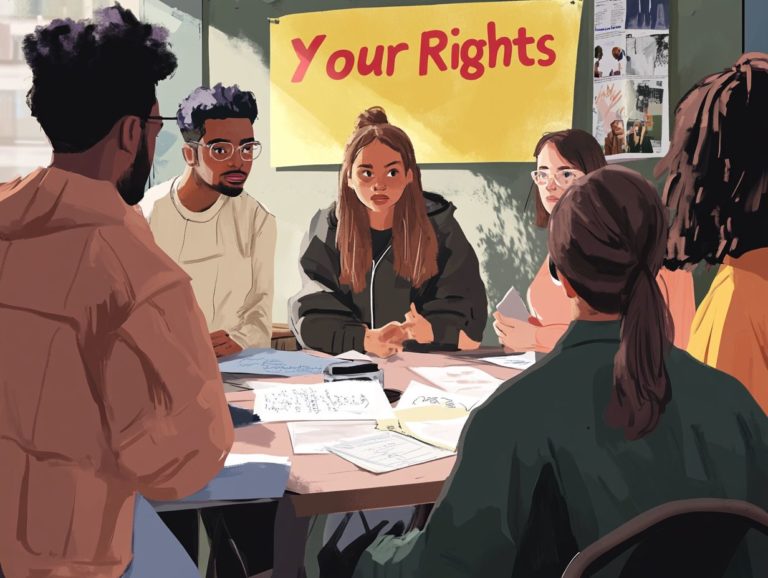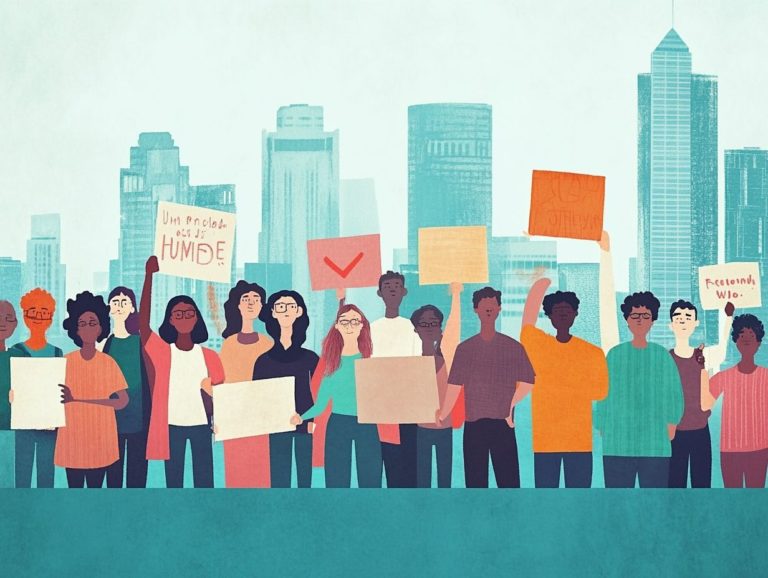How to Educate Yourself on Legal Rights
Understanding your legal rights is paramount in today s intricate landscape. From workplace protections to access to healthcare, being informed not only empowers you but also enables you to safeguard yourself and those around you. This article reveals why knowing your rights is vital and provides practical strategies for educating yourself. It emphasizes critical areas such as workplace rights, the criminal justice system, and healthcare.
Equip yourself with the knowledge necessary to navigate legal challenges confidently and advocate effectively for yourself and others.
Contents
- Key Takeaways:
- Understanding Legal Rights
- Why it is Important to Educate Yourself on Legal Rights
- How to Educate Yourself on Legal Rights
- Common Legal Rights to Know
- Rights in the Workplace
- Rights in Criminal Justice System
- Rights in Healthcare
- Frequently Asked Questions
- What are legal rights?
- Why is it important to educate yourself on legal rights?
- How can I educate myself on legal rights?
- What are some common legal rights that individuals should be aware of?
- How often should I review my legal rights?
- Can I seek legal assistance if my rights have been violated?
Key Takeaways:

Know your legal rights. They are the rights granted to you by laws and regulations. You must educate yourself on knowledge of your rights for your protection and advocacy. Research laws and regulations, consult with legal professionals, and join advocacy groups to educate yourself on legal rights.
Understanding Legal Rights
Understanding your legal rights is essential. This applies whether you re a student, a community member, or a professional. It gives you the power to exercise those rights, access critical resources, and navigate the complex maze of laws and regulations that shape our society.
Whether you re looking into civil rights enshrined in the U.S. Constitution or seeking protections against discrimination in employment or education, knowing your legal rights equips you to safeguard yourself against violations and promotes a culture of equity and inclusion.
Understanding historical documents like the Declaration of Independence is key. The advocacy of organizations such as Disability Rights Advocates shows that grasping your legal rights transcends mere academic interest; it s a crucial facet of social justice and personal empowerment.
What are Legal Rights?
Legal rights are rights given to you by the law, designed to shield you from discrimination, ensure equality, and grant access to justice.
These rights cover a broad spectrum of protections. Civil rights, for example, defend you against unjust treatment based on race, gender, or religion. Employment rights ensure you receive fair wages, work in safe conditions, and are protected from wrongful termination. Healthcare rights guarantee you access to essential medical services when you need them.
Amendments to the Constitution are fundamental in defining and reinforcing these rights. These changes to the Constitution protect individual freedoms, with the First Amendment standing out for its protection of freedoms related to speech, religion, assembly, and the press.
Without these legal frameworks in place, you would lack the crucial tools necessary to uphold your dignity and pursue a just society.
Why it is Important to Educate Yourself on Legal Rights
Educating yourself on your legal rights is essential for navigating various situations, whether in the workplace, healthcare settings, or during interactions with law enforcement. When you possess knowledge of your legal rights, you can empower yourself to advocate effectively for both yourself and others. Learning how to use legal aid contributes to a community that prioritizes equality and social justice.
Challenges like discrimination and access barriers are still common, making it vital to understand the legal frameworks that uphold civil rights. This knowledge helps mitigate rights violations and fosters an equitable society for all.
Protecting Yourself and Others
Protecting yourself and those around you starts with understanding and asserting your legal rights. This fosters a culture of empowerment and support within your community. By educating yourself about anti-discrimination laws and the resources available, you can confidently advocate for yourself and stand up against injustices.
For instance, attending local workshops or seminars on your rights can arm you with essential knowledge. When faced with discrimination, it’s crucial to document the incident, gather evidence, and report it to the appropriate authorities or organizations.
Legal assistance is accessible through community legal clinics that offer free or low-cost services, including consultations for individuals who have been wronged. You can also engage in advocacy efforts by joining local groups focused on social justice or participating in awareness campaigns, creating a collective alliance dedicated to upholding equality for everyone.
Take the first step today learn your rights and empower yourself!
How to Educate Yourself on Legal Rights

Educating yourself on your legal rights demands a comprehensive approach. It involves looking into relevant laws and regulations, seeking insights from legal professionals, and actively participating with advocacy groups committed to advancing civil rights and social justice. Additionally, learning how to stay informed about your rights can empower you further in this journey.
Researching Laws and Regulations
Researching laws and regulations is a fundamental step in understanding your legal rights. It empowers you to navigate the complex legal system and identify the protections available to you under the law.
With accurate knowledge at your disposal, you can advocate for yourself more effectively be it regarding workplace rights under the Americans with Disabilities Act or immigration protections through DACA (Deferred Action for Childhood Arrivals), a program that protects young immigrants.
You can enhance your understanding by using legal databases, government websites, and resources from reputable organizations. For instance, accessing the U.S. Department of Justice’s website can provide critical information about protections against discrimination.
Various legal aid organizations often offer guides tailored to your specific situation. These tools are invaluable, ensuring you can make informed decisions about your rights and navigate any legal challenges with confidence.
Consulting with Legal Professionals
Talking to legal professionals is crucial for understanding your rights! These experts are equipped to assess your unique circumstances and provide personalized advice.
Be open and detailed when discussing your issues; this transparency enables attorneys to offer the most effective assistance. Legal advocacy groups can strengthen your support system while facing legal challenges.
These organizations frequently provide valuable resources, informational workshops, and connections to trusted legal professionals, empowering you to navigate your legal landscape with confidence.
Joining Advocacy Groups
Joining advocacy groups can significantly enhance your understanding of legal rights and promotes social justice through community engagement. These groups offer invaluable networking opportunities, connecting you with like-minded advocates who share your passion for change.
By collaborating with others, you gain access to a wealth of resources, including workshops, legal consultations, and educational materials, all designed to empower you in your quest for equality.
The collective efforts of these advocacy groups address legal issues that disproportionately affect marginalized communities, amplifying their voices in ways that would be challenging to achieve on your own.
Join these organizations today! Your involvement can spark real change in society!
Common Legal Rights to Know
Grasping your legal rights is crucial for effectively navigating various aspects of life, including the workplace, healthcare, and the criminal justice system.
With a solid understanding of these rights, you empower yourself to advocate for your needs and make informed decisions in any situation that arises.
Rights in the Workplace

Workplace rights encompass a vital set of protections that ensure you are treated fairly and without discrimination in your professional environment. These rights ensure you receive equal pay.
You deserve the same compensation for the same work, no matter your gender, race, or background. Anti-discrimination laws safeguard you against unfair treatment based on age, disability, or ethnicity.
The right to safe working conditions is paramount, as it requires employers to adhere to safety regulations that protect your health and well-being. These legal protections, enshrined in various federal laws such as the Equal Pay Act and the Occupational Safety and Health Act, are crucial for fostering a respectful workplace culture.
Start your journey to understanding your rights today knowledge is power!
Rights in Criminal Justice System
Rights in the criminal justice system protect you during interactions with law enforcement and throughout the legal process. These rights are important for ensuring fairness and justice against potential abuses of power.
Your right to remain silent helps prevent self-incrimination. It allows you to avoid making statements that could be used against you.
The right to an attorney ensures you have access to legal representation. This access is crucial for understanding the legal system.
Protections against unlawful searches ensure you won t face invasive actions without justification. This preserves the balance between security and personal freedoms.
Rights in Healthcare
Rights in healthcare ensure you can access medical services without discrimination. This includes protections based on race, gender, disability, or economic status.
You have the right to receive comprehensive information about your treatment options. This includes understanding the potential risks involved before making decisions.
Laws like the Americans with Disabilities Act offer vital protections. They ensure individuals with disabilities receive fair treatment in medical settings.
Knowing your rights empowers you to advocate for your needs. This contributes to a more inclusive healthcare environment where everyone can seek help confidently.
Frequently Asked Questions
What are legal rights?
Legal rights refer to protections granted to individuals under the law. They include basic human rights like the right to life and freedom from discrimination, as well as rights like a fair trial and property ownership.
Why is it important to educate yourself on legal rights?

Knowing your legal rights is crucial for ensuring they are protected. It helps you make informed decisions if your rights are violated.
How can I educate myself on legal rights?
You can attend workshops, read books, or seek advice from legal professionals. Online resources from government websites or legal aid organizations are also helpful.
What are some common legal rights that individuals should be aware of?
Common legal rights include the right to free speech, a fair trial, privacy, voting, and freedom from discrimination.
How often should I review my legal rights?
Review your legal rights regularly, as laws can change. It s wise to check them before any legal agreements or if facing a potential legal issue.
Can I seek legal assistance if my rights have been violated?
Yes, you can seek legal help if your rights are violated. Contact a lawyer or your local legal aid organization for guidance. Act quickly, as there may be time limits for legal action.






